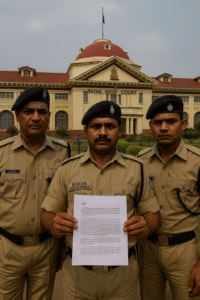Simplified Explanation of the Judgment
In this case, the petitioner — a firm of Chartered Accountants — challenged the rejection of their bid to be appointed as concurrent auditors by the Bihar Education Project Council (BEPC) for the financial year 2020-2021. The grievance stemmed from a technical rejection during the tender process under the Samagra Shiksha scheme.
The firm submitted all required documents, including what they identified as the “constitution certificate” of their firm — a mandatory document under the tender rules. Alongside it, they also provided a firm card detailing their constitution and other relevant data. However, the BEPC’s Tender Evaluation Committee deemed the documents incomplete or not in the expected format. As a result, the bid was disqualified at the technical evaluation stage.
Crucially, the petitioner raised objections to this rejection the very next day, arguing that their certificate contained all the required information — albeit not in the exact format or terminology anticipated by the Council. Despite this timely complaint, the Council proceeded to open financial bids and finalize selections, leaving the petitioner out of the process.
During the court proceedings, the State and BEPC did not allege any malafide intentions or irregularities in the petitioner’s previous work, acknowledging that the petitioner had been selected for two consecutive years earlier. However, they defended the rejection as a “technical” decision.
Justice Ashutosh Kumar of the Patna High Court found this reasoning unconvincing. He noted that while the petitioner’s certificate might have differed in format or phrasing from others, the substance and information required were fully present. The Court emphasized that excessive reliance on form over content leads to unjust exclusion, especially when prior performance and credibility are not in question.
However, given that the selection process had already concluded and auditors had been appointed, the Court refrained from interfering with the current year’s selections. Instead, it issued a protective directive: the petitioner’s current litigation must not prejudice their candidacy in future appointments. Furthermore, the Court advised the BEPC to be more precise and explicit in future advertisements, especially regarding document format requirements.
The judgment thus strikes a balance between administrative finality and fairness, criticizing bureaucratic inflexibility while offering safeguards for the aggrieved party in future processes.
Significance or Implication of the Judgment
This decision has broader implications for how government agencies and public institutions handle tenders and contractual appointments. It signals that:
- Government bodies must avoid hyper-technical rejections that ignore the substance of documents.
- Transparency and clarity in tender requirements are essential. Vague or poorly defined expectations lead to unfair exclusions.
- Past credible performance should be a factor in evaluating technical compliance, especially when the error is procedural, not substantive.
- Judicial oversight will act as a check on arbitrary bureaucratic decisions.
For professionals and firms participating in public procurement, this judgment underscores the importance of form and format — but also offers judicial recourse when fairness is compromised by rigid processes.
Legal Issue(s) Decided and the Court’s Decision with Reasoning
- Was the rejection of the petitioner’s bid justified due to the format of the constitution certificate?
- No. The Court held that the petitioner had submitted all necessary information, even if the format or terminology differed. The substance met the evaluation requirements.
- Did the BEPC act with mala fide intent?
- No. The Court accepted that the rejection was not driven by malice, as the petitioner had been previously selected twice. However, the rejection was still found to be technically unsound.
- Should the Court interfere with the completed selection process?
- No. Since appointments had already been made, the Court chose not to reverse the process but directed that this litigation should not affect the petitioner’s future prospects.
- Should government bodies clarify tender requirements more specifically?
- Yes. The Court advised the BEPC to provide clear, detailed instructions — especially regarding document formats like constitution certificates — to prevent future disputes.
Case Title
Subodh Goel and Co. Chartered Accountants v. State of Bihar & Others
Case Number
CWJC No. 7711 of 2020
Citation(s)
2021(1)PLJR 176
Coram and Names of Judges
Hon’ble Mr. Justice Ashutosh Kumar
Names of Advocates and Who They Appeared For
- Mr. S.D. Sanjay, Sr. Adv. — for the petitioner
- Mr. Girijesh Kumar — for the Bihar Education Project Council
- Mr. Priyadarshi Matri Sharan — for the State
Link to Judgment
https://patnahighcourt.gov.in/viewjudgment/MTUjNzcxMSMyMDIwIzEjTg==-XLPyATDHB10=
If you found this explanation helpful and wish to stay informed about how legal developments may affect your rights in Bihar, you may consider following Samvida Law Associates for more updates.









